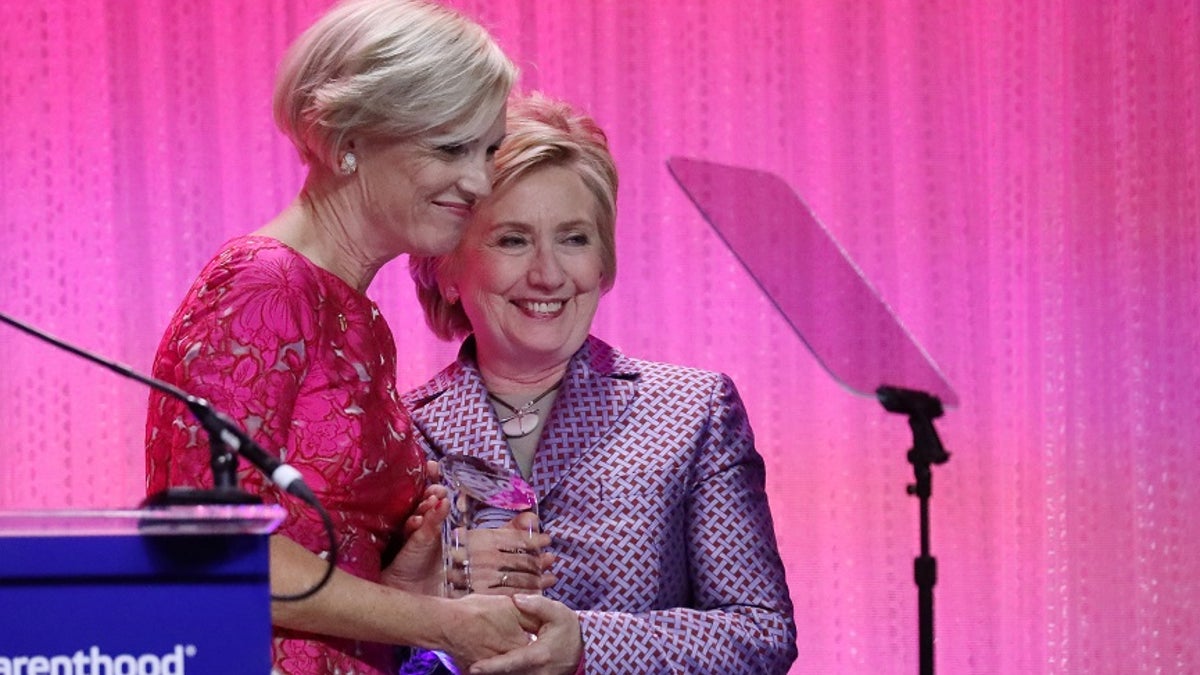
May 2, 2017: Former U.S. Secretary of State Hillary Clinton stands with Cecile Richards, president of Planned Parenthood Federation of America, during the Planned Parenthood 100 Years Gala in New York, U.S. (Reuters)
Outgoing Planned Parenthood President and CEO Cecile Richards just published a book detailing her lifetime of pro-choice activism. The book, as expected, is essentially Richards’ stump speech in defense of her radical positions on abortion. But Richards makes one claim in the book that is worth examining.
In the book, titled “Make Trouble,” Richards writes that as pro-choice activists “fight for abortion access in America every day,” they’re also “transforming the culture” so they can “quit apologizing for abortion.”
Planned Parenthood certainly has made efforts to influence the culture – celebrities have donned Planned Parenthood pins on the red carpet and recorded fundraiser albums for the organization. Richards appeared on stage at this year’s Oscars during a segment celebrating activists. Much like those efforts, her book will likely receive fawning coverage from the media. But try as she might to truly transform the culture, Richards is failing to do so.
Ten years of research on public opinion of abortion by Marist—the polling company for The Wall Street Journal, NBC News and Thomson Reuters/McClatchy—shows that Americans consistently support significant restrictions on abortion.
This year’s Marist poll on abortion, sponsored by the Knights of Columbus, found that more than three quarters of Americans would limit abortion to — at most — the first three months of pregnancy. A majority of Americans—56 percent—said they believe abortion is morally wrong.
Americans’ continued support for restrictions on abortion show that, despite Cecile Richards’s best efforts and deep pockets, pro-choice activism is not “transforming the culture.” Love is winning.
Americans also recognize that, no matter how much Planned Parenthood and its supporters claim to speak for feminism, to be pro-life is to be pro-woman: 52 percent of respondents, as well as 52 percent of women, said having an abortion will more likely cause harm to a woman’s life than good. Likewise, 78 percent of Americans said that our laws can protect both the well-being of women and the lives of the unborn rather than choose between them.
Finally, the poll makes clear that much of what Planned Parenthood advocates falls far out of the mainstream. For example, 63 percent of Americans support banning abortion after 20 weeks of pregnancy unless the mother’s life is at risk, while just 33 percent oppose such a ban. Planned Parenthood, of course, finds itself within that small minority. Most Americans also oppose the use of taxpayer dollars to pay for elective abortion procedures – another position Planned Parenthood embraces that places them in a minority.
In truth, there is a consensus in our culture on abortion: Americans support major rollbacks on abortion. That’s because the pro-life movement is winning hearts and minds on this issue.
In January, for the 45th time, a hundred thousand Americans – primarily young people -- participated in the March for Life, the world’s largest annual human rights demonstration. Our theme this year was “Love Saves Lives,” illustrating that the mission of the pro-life movement is love. Our culture craves real, sacrificial, heroic love. Love is universally attractive because we as humans find true fulfillment in the giving of ourselves.
Our movement shows that love doesn’t just save lives, it transforms them. That’s why year after year, thousands of Americans march—rain, sleet, snow or shine—to protest the violence of abortion and in support of life-affirming alternatives. We will continue to do so until abortion is unthinkable.
Marchers aren’t the only example of love in the pro-life movement: Officer Ryan Holets encountered a pregnant woman using drugs and, respecting both her humanity and the humanity of her unborn child, offered to adopt the baby and help her seek treatment for her addiction. Adoptive parents like him personify our mission. So do the men and women who aid expectant mothers and their unborn children at pregnancy care centers by providing such resources as adoption service, parenting classes, and baby supplies.
Americans’ continued support for restrictions on abortion show that, despite Cecile Richards’s best efforts and deep pockets, pro-choice activism is not “transforming the culture.” Love is winning.




















